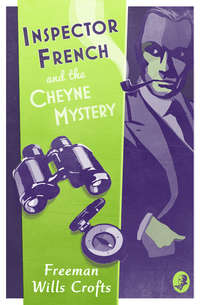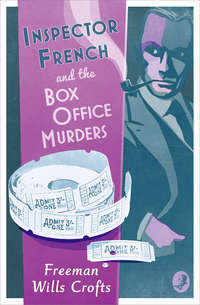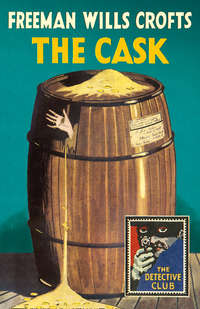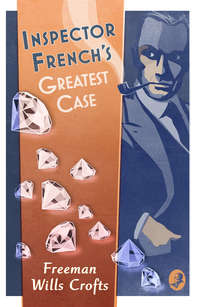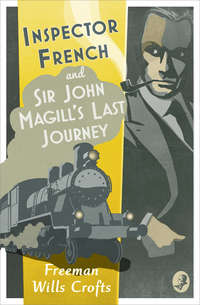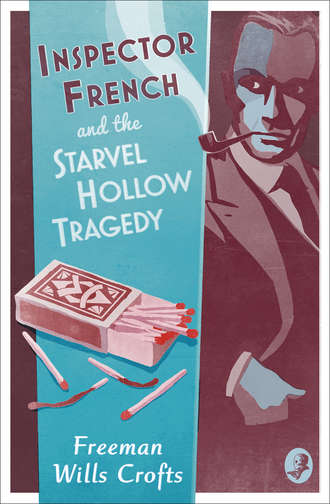
Полная версия
Inspector French and the Starvel Hollow Tragedy
Mr Oxley started.
‘Good Heavens, Tarkington! Are you sure of that?’ he queried sharply.
‘Not absolutely,’ the other replied. ‘It was certainly my strong opinion and if I had been asked before the fire I should have had no doubt. When I heard the evidence at the inquest I concluded I had made a mistake. But now this affair of the twenty-pound note has reawakened all my suspicions.’ He paused, but as Oxley did not reply, continued: ‘Perhaps I’ve got a bee in my bonnet as you said, but I’m now wondering if Roper’s drunkenness doesn’t support the theory? Could he not have been enticed into Thirsby by some member of the gang and treated so as to make him sleep well and not hear what was going on? Remember, he was an absolutely temperate man.’
‘Not absolutely. Ruth had smelt drink on other occasions.’
‘You are right. Perhaps that is a trifle far-fetched. But what do you think on the main point, Oxley? Ought I to tell the police of my suspicions?’
Mr Oxley rose and began to pace the room. Then he went to the window and stood for some moments looking out. Finally he returned to his chair, and sat down again.
‘I declare, Tarkington, I think you ought,’ he said slowly. ‘When you first made your—I might perhaps say—your amazing suggestion I confess I thought it merely grotesque. But if you are right about the safe it certainly puts a different complexion on the whole business. I take it it’s not too late to ascertain? The safe is not too much damaged to trace the maker and find out from him?’
‘I should think the police could find the maker quite easily.’
‘Well, I think you should tell them. If you are wrong no harm is done. If not, there are murderers to be brought to justice and perhaps a fortune to be recovered for Ruth.’
Mr Tarkington rose.
‘I agree with you, Oxley. I’ll go down to the police station and tell Kent now.’
Mr Oxley waved him back into his seat.
‘Steady a moment,’ he said. ‘Don’t be in such a hurry.’ He drew slowly at his cigarette while the other sat down and waited expectantly.
‘It seems to me,’ went on Mr Oxley, ‘that if your suspicions are correct the thing should be kept absolutely quiet. Nothing should be said or done to put the criminals on their guard. Now Kent, you know as well as I do, is just a bungling ass. My suggestion is that we both take the afternoon off and go see Valentine. I know him pretty well and we could ring him up and make an appointment.’
‘Valentine, the chief constable of the County?’
‘Yes. He’s as cute as they’re made and he’ll do the right thing.’
‘Kent will never forgive us if we pass him over like that.’
‘Kent be hanged,’ Mr Oxley rejoined. ‘Can you come in by the three-thirty?’
‘Yes, I’ll manage it.’
‘Right. Then I shall ring up Valentine.’
Five hours later the two friends found their way into the strangers’ room of the Junior Services Club in Leeds. There in a few moments Chief Constable Valentine joined them, and soon they were settled in a private room with whisky and sodas at their elbows and three of the excellent cigars the chief constable favoured between their lips.
Mr Tarkington propounded his theory in detail, explaining that he was not sure enough of his facts even to put forward a definite suspicion, but that he and his friend Oxley agreed that Major Valentine ought to know what was in his mind. The major could then, if he thought fit, investigate the affair.
That the chief constable was impressed by the statement was obvious. He listened with the keenest interest, interjecting only an occasional ‘By Jove!’ as Mr Tarkington made his points. Then he thanked the two men for their information, and promised to institute inquiries into the whole matter without delay.
Two days later Mr Tarkington received a letter from Major Valentine saying that he thought it only fair to inform him in the strictest confidence that his belief that the safe was fireproof was well founded, that he, the chief constable, strongly suspected that more had taken place at Starvel on that tragic night than had come out in the inquest, and that as he considered the matter was rather outside the local men’s capacity he had applied to Scotland Yard for help in the investigation.
Mr Tarkington, honouring the spirit rather than the letter of the chief constable’s communication, showed the note to Mr Oxley, and the two men sat over the former’s study fire until late that night, discussing possible developments in the situation.
4
Inspector French Goes North
The stone which Messrs Tarkington and Oxley had thrown into the turbid waters of the British Police Administration produced ripples which, like other similar wave forms, spread slowly away from their point of disturbance. One of these ripples, penetrating into the grim fastness of the Criminal Investigation Department of New Scotland Yard, had the effect of ringing the bell of a telephone on the desk of Detective Inspector Joseph French and of causing that zealous and efficient officer, when he had duly applied his ear to the instrument, to leave his seat and proceed without loss of time to the room of his immediate superior.
‘Ah, French,’ Chief Inspector Mitchell remarked on his entry. ‘You should be about through with that Kensington case, I fancy?’
‘Just finished with it, sir,’ French answered. ‘I was putting the last of the papers in order when you rang.’
‘Well, you’ve had a lot of trouble with it and I should have liked to have given you a breather. But I’m afraid I can’t.’
‘Something come in, sir?’
‘A Yorkshire case. A place called Thirsby, up on the moors not far, I understand, from Hellifield. We’ve just had a request for a man and I can’t spare anyone else at present. So it’s you for it.’
‘What is the case, sir?’
‘Suspected murder, robbery and arson. The people there appear to know very little about it and the whole thing may turn out a mare’s nest. But they’re darned mysterious about it—say they don’t want it to be known that inquiries are being made and suggest our man might go to the Thirsdale Arms, the local hotel, in the guise of an angler or an artist. So, if you’re a fisherman, French, now’s your chance. You’re to call down at the police station after dark, when Sergeant Kent, who’s in charge, will give you the particulars.’
It was with mixed feelings that Inspector French received his instructions. He delighted in travelling and seeing new country, and the Yorkshire moors comprised a district which he had often heard spoken of enthusiastically, but had never visited. He was by no means averse, moreover, to getting away from town for a few days. It would be a welcome break in the monotony of the long winter. But on the other hand he loathed working away from headquarters, bereft of his trained staff and of the immediate backing of the huge machine of which he was a cog. Local men, he conceded, were ‘right enough,’ but they hadn’t the knowledge, the experience, the technique to be really helpful. And then the ‘Yard’ man in the country was usually up against jealousies and a more or less veiled obstruction, and to the worries of his case he had to add the effort always to be tactful and to carry his professed helpers with him.
However, none of these considerations affected his course of action. He had his orders and he must carry them out. He completed the filing of the papers in the Kensington murder case, handed over one or two other matters to his immediate subordinate, and taking the large despatch case of apparatus without which he never travelled, went home to inform his wife of his change of plans and pack a suitcase with his modest personal requirements. Then he drove to St Pancras and caught the 12.15 p.m. restaurant car express to the north.
He was neither an artist nor an angler, and in any case he considered the month of November was scarcely a propitious time for worthies of either type to be abroad. Therefore beyond dressing in a more countrified style than he would have effected in town, he attempted no disguise.
He changed at Hellifield and took the branch line which wound up in a north-easterly direction into the bleak hills and moors of western Yorkshire. Six o’clock had just struck when he reached the diminutive terminus of Thirsby.
A porter bearing the legend ‘Thirsdale Arms’ on his cap was at the station, and having surrendered his baggage, French followed the man on foot down the main street of the little town to a low, straggling, old-fashioned building with half-timbered gables and a real old swinging sign. Here a stout and cheery proprietor gave him a somewhat voluble welcome, and soon he was the temporary tenant of a low and dark, but otherwise comfortable bedroom, while an appetising odour of frying ham indicated that the pièce de résistance of his supper was in full preparation.
He smoked a contemplative pipe in the bar, then about half past eight took his hat, and passing the landlord at the door, gave him a cheerful goodnight and said he was going for a walk before bed.
While he did not intend to hide the fact of his visit to Sergeant Kent, he had no wish to draw attention thereto. He believed that in a small town such things invariably get out, and to shroud them in an air of mystery was only to invite publicity. He therefore did not ask for a direction, but instead strolled through the streets until he saw the police station, walking quietly but openly to the door, he knocked. Two minutes later he was shaking hands with the sergeant in the latter’s room.
‘I’m sure I’m grateful to you for giving me the chance of a change from London,’ French began in his pleasant, cheery way as he took the chair the other pulled forward to the fire. ‘Will you join me in a cigar, or do you object to smoking in the office?’
The sergeant dourly helped himself from French’s case, and gruffly admitted he was not above the use of tobacco after office hours. French seemed in no hurry to come to business, but chatted on about his journey and his impressions of the country, drawing the other out and deferring to his views in a way that was nothing less than flattering. Before ten minutes Kent had forgotten that his visitor was an interloper sent to him over his head because his superiors imagined that he was not good enough for his own job, and was thinking that this stranger, for a Londoner and a Yard man, was not as bad as he might reasonably have been expected to be. Under the soothing influences of flattery and good tobacco he gradually mellowed until, when French at last decided the time had come, he was quite willing to assist in any way in his power.
At French’s request he gave him a detailed account of the tragedy together with a copy of the depositions taken at the inquest, and then went on to describe the bomb which Mr Tarkington had dropped when he mentioned his theories to Major Valentine.
‘Chief Constable, he told me to find out what kind of safe it was in the house,’ the sergeant went on. ‘I knew, for I had seen it at the time, but I went out again to make sure. It was made by Carter & Stephenson of Leeds, number—’ he referred to a well-thumbed notebook—‘12,473. I went down to Leeds, and saw the makers, and they said the safe was twenty years old, but it was the best fireproof safe of its day. I asked them would the notes have burned up in it, and they said they wouldn’t scarcely be browned, no matter how fierce the fire might be.’
‘And what exactly was in the safe?’
‘Just paper ashes and sovereigns. No whole papers; all was burned to ashes.’
‘Could I see those ashes? Are any of them left?’
‘I think so. We took out the sovereigns and left the rest. The safe is lying in the rubbish where we found it.’
French nodded, and for some minutes sat silent, drawing slowly at his cigar while he turned over in his mind the details he had learned. As he did so the words of Chief Inspector Mitchell recurred to him: ‘The people down there don’t appear to know much about it, and the whole thing may turn out to be a mare’s nest.’ Now, having heard the story, he wondered if this was not going to be another of his chief’s amazing intuitions. It certainly looked as like a mare’s nest as anything he had ever handled. The only shred of evidence for foul play was the safe builder’s statement that their safe would protect papers even in the fiercest fire, and that statement left him cold. What else could the builders say? They had sold the thing as fireproof; how could they now admit they had made a false claim? And this Tarkington’s theory of the twenty-pound note was even less convincing. There was no real reason to believe that Averill had not handed it to his servant or to a visitor or sent it away by post. In fact, the whole tale was the thinnest he had listened to for many a day, and he saw himself taking a return train to St Pancras before many hours had passed.
But he had been sent up to make an investigation, and make an investigation he would. He rapidly planned his line of action. The first thing to be done was to get rid of this sergeant. He might be right enough for his own job, but French felt that he would be no help in an affair of this kind. Left to himself, he would go out and examine the house and then interview Tarkington. By that time he should have learned enough at least to decide whether or not to go on with the case. He turned to Kent.
‘Your statement, Sergeant, has been so very complete that I do not believe there is anything left for me to ask you. But I think I should understand the affair even better if I went and had a look at the house. I’ll do that tomorrow. But, much as I should like your company, I cannot ask you to come with me. I entirely agree with and admire your wisdom in keeping the affair secret, and if we were seen together the cat would be out of the bag. I will give out that I am a representative from the insurance companies and I think no suspicion will be aroused. If now you will kindly tell me where the place lies, I think that’s all we can do in the meantime.’
Five minutes later French turned from the main street into the door of the Thirsdale Arms. The landlord was standing in the hall and French stopped in a leisurely way, as if ready for a chat. They discussed the weather for some moments, and then French asked the other if he would join him in a drink.
It was not long before they were seated before a glowing fire in the private bar, when French proceeded to account for himself.
‘I like your country,’ he began, ‘what I’ve seen of it. I’ve been a bit run down lately, and though it’s not the time one would choose for a holiday, my doctor thought I should take a week or two’s rest. So, as I had a bit of business here I thought I would kill two birds with one stone and do my business and take my holiday at the same time. And about that bit of business I thought that if you would be good enough you could maybe give me some help.’
The landlord, evidently curious, was anxious to do anything in his power, and French, following out his theory that where absolute truth is inadmissible, deviations therefrom should be as slight as possible, went on confidentially:
‘It’s about a place called Starvel where there was a big fire recently. You know all about it, of course.’ The landlord nodded eagerly. ‘Well, I may tell you strictly between ourselves that I am a detective. A fire unaccounted for is a very disturbing matter to insurance companies, and I have been sent down to try to find the cause of the outbreak. I’ve seen the police sergeant, and he has very kindly promised to show me his notes of the inquest, but I should like more general information than that. I wondered if you could, perhaps, tell me something about the affair; about the people who lived in Starvel, and so on?’
With this beginning, and the help of whiskies and sodas and two more of his cigars French was soon in possession of all the landlord knew and surmised about the Starvel Hollow tragedy. But he learned nothing helpful. The man’s story agreed with that of Sergeant Kent, though it was obvious that the idea of foul play had never entered his mind.
One thing he remarked on which Kent had not mentioned—about which indeed, as French afterwards learned, Kent knew nothing—and that was the incipient affair between Ruth Averill and Pierce Whymper. When French learned later on how slight this affair had been he was filled with amazement, as he had been so many times before, at the range and exhaustiveness of local gossip.
‘Nice young fellow, Mr Pierce Whymper,’ the landlord went on. ‘He’s a son of Mr Stephen Whymper, the Leeds surgeon, and a junior assistant of Nixon and Arbuthnot’s, the church architects. He’s here as clerk of works of the renovation of the church—a fine old church, this of ours! I got to know Mr Whymper a bit, for he stayed here for a few days when he came first, and before he got lodgings. Our terms are a bit high for him, you know, for a constancy. They don’t overpay these young fellows that are just starting on their jobs.’
‘It’s a fact,’ French admitted. ‘And how is the affair with the young lady getting on?’
‘No one rightly knows. It seemed to be going on thick enough before the fire and then, somehow, it seemed to be cooled off. I suppose one of these here lovers’ quarrels,’ and the landlord smiled tolerantly, as one man of the world to another.
But whether or not the landlord was a man of the world, there was no doubt whatever that he was a thoroughly accomplished and successful gossip. French soon found that by the mere interjection of an occasional phrase he could obtain a detailed description of the life, habits and character of any of the inhabitants of Thirsby that he cared to name. Very willingly, therefore, he suggested more whisky and proffered further cigars, while he sat registering in his memory the impressions of his neighbours which the other sketched with such evident relish.
He was a likeable old fellow, the landlord, or so French thought. Though a gossip first and always, he was something of a philosopher and his outlook was human and kindly. The people he spoke of were real people, and French could picture them living in the little town and going about their businesses, with their loves and hates, their ambitions and their weaknesses. Old Mr Averill—well, the landlord hadn’t a great opinion of him. He was dead, and one didn’t ought to say too much about the dead, but there was no denying that he was mean—a regular miser, he was. The way he had treated that niece of his—as nice a young lady as ever stepped—was just a fair scandal. A young lady just grown up, like Miss Ruth was, should have a bit of pleasure sometimes, and the poor girl hadn’t even decent clothes to wear. Mean, the landlord called it. And what use, he asked, growing oratorical, was the old man’s money to him now? That was what he said—and he waved his cigar to give point to his remark—that was what he said: What had the old man got for all his screwing and saving? It would have paid him better …
French insinuated the idea of Roper.
Roper, the landlord did not know so much about, though he had to confess he had not particularly liked him. Roper had a squint, and if French took the landlord’s advice, he would just keep his weather eye open when dealing with a man with a squint. Roper was quiet enough and civil spoken, and they said he was good enough at his job, but he was close—very close. Sly, the landlord would call it, though, mind you, he hadn’t known anything wrong about the man. Mrs Roper? He had only met her once. He didn’t know much about her, but she was well enough spoken of. Neither of them could have had much of a time out at Starvel, but they had served the old man well and made no complaint.
About Tarkington, the landlord waxed almost lyrical. Tarkington was a white man, straight as a die and no fool neither. He was more than a bank manager. He was, so French gathered, a sort of financial father confessor to the neighbourhood. Everyone trusted Tarkington, and took their difficulties to him for help and advice. And Tarkington gave both, in good measure pressed down and shaken together. He did not spare himself, and if he could help a lame dog over a stile, he did it. What Tarkington said went, as far as most things were concerned.
The landlord also approved of Oxley. Oxley would have his joke, if he was to be hung for it the next minute, but he was a very sound man and a good lawyer. If you had Oxley on your side he would make a keen fight for you, and for all his jokes and his breezy manner he wouldn’t give nothing away. Oxley was well liked and he deserved it.
Of the medical profession in Thirsby the landlord was equally ready to impart information. Dr Emerson was a good doctor and well respected, but he was growing old. He hardly did any work now, but he had made plenty and he could afford to retire. Not that he had been a money-grubber—the landlord had known many a case where he had treated poor patients free—but until Dr Philpot had come he had the whole of the practice, and he hadn’t done badly with it. The landlord wished that hotel keeping was half as profitable. Well off, Dr Emerson was.
French next murmured Dr Philpot’s name, but the landlord spoke with more reserve. He was a clever man, first rate at his job, the landlord believed, though he was thankful to say he hadn’t ever needed to call him in. But he had made some good cures and people that had had him once wouldn’t have anybody else. And he was pleasant spoken and likeable enough, and there was no reason why he shouldn’t have done extra well at Thirsby, for there was an opening for just such a man on account of Dr Emerson’s age. But—the landlord sank his voice and became more confidential than ever—the truth was he had made a muck of things, and no one would be surprised to see him take down his plate any day. He was all right in every way, but the one—he was a wild gambler. Fair ruining himself, he was. Horses mostly. It was a pity, because he was well liked otherwise. But there you were. The landlord had nothing to say about backing an occasional horse—he did it himself—but, systematic gambling! Well, you know, it could go too far.
French was interested to learn that Sergeant Kent was a fool. The landlord did not put it quite in those words, but he conveyed the idea extraordinarily well. Kent was bumptious and overbearing, and carried away by a sense of his own importance. French, the landlord was afraid, wouldn’t get much help there.
The landlord showed signs of a willingness to go on talking all night, but by the time eleven-thirty had struck on the old grandfather’s clock in the hall French thought he had all the information that was likely to be valuable. He therefore began insinuating the idea of bed, and this gradually penetrating to the other’s consciousness, his flow of conversation diminished and presently they separated.
The next day was Sunday, and after a late breakfast and a leisurely pipe, French asked for some sandwiches, saying he was going out for a long tramp over the moor. Having thus explained himself he strolled off and presently, by a circuitous route, reached the lip of Starvel Hollow.
In spite of the fact that his professional and critical interests were aroused, French could not help feeling impressed by the isolation of the ruins and the morbid, not to say sinister atmosphere which seemed to brood over the entire place. Around him were the wild rolling spaces of the moor, forbidding and desolate, rising here into rounded hills, dropping there into shallow valleys. The colouring was drab, in the foreground the dull greens of rushes and sedgy grass, the browns of heather and at intervals a darker smudge where stone outcropped, on the horizon the hazy blues of distance. Scarcely a tree or a shrub was to be seen in the bare country, and the two or three widely separated cottages, crouching low as if for protection from the winds, seemed only to intensify the loneliness of the outlook.
At French’s feet lay the Hollow, a curious, saucer-like depression in the moor, some quarter of a mile or more across. Its rim looked continuous, the valley through which it was drained being winding and not apparent at first sight. In the centre was the group of pines which had surrounded the old house, stunted, leaning one way from the prevailing wind, melancholy and depressing. Of the walls of the house from this point of view there was no sign.


